French Apple Tart
- By Jennifer Segal
- Updated October 23, 2025
- 1,007 Comments
- Leave a Review

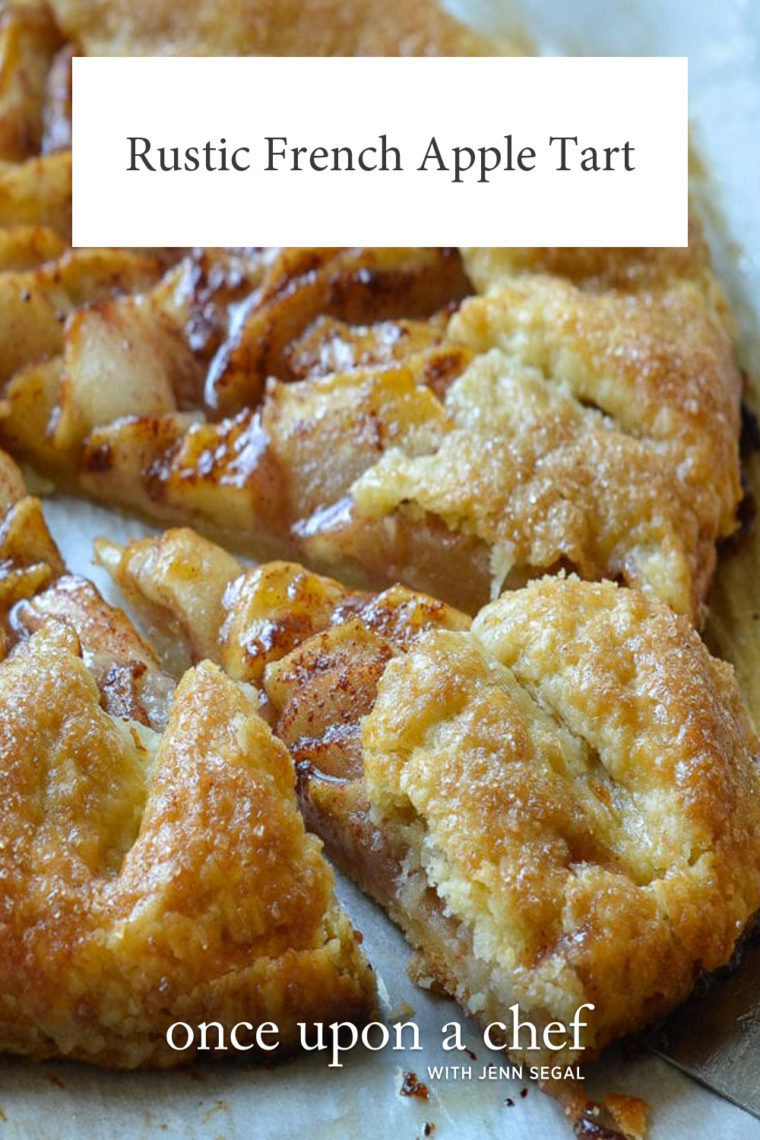
This post may contain affiliate links. Read my full disclosure policy.
This apple tart recipe is what cozy fall baking is all about—flaky crust, cinnamon-scented apples, and that buttery, straight-from-the-oven goodness you can’t resist.
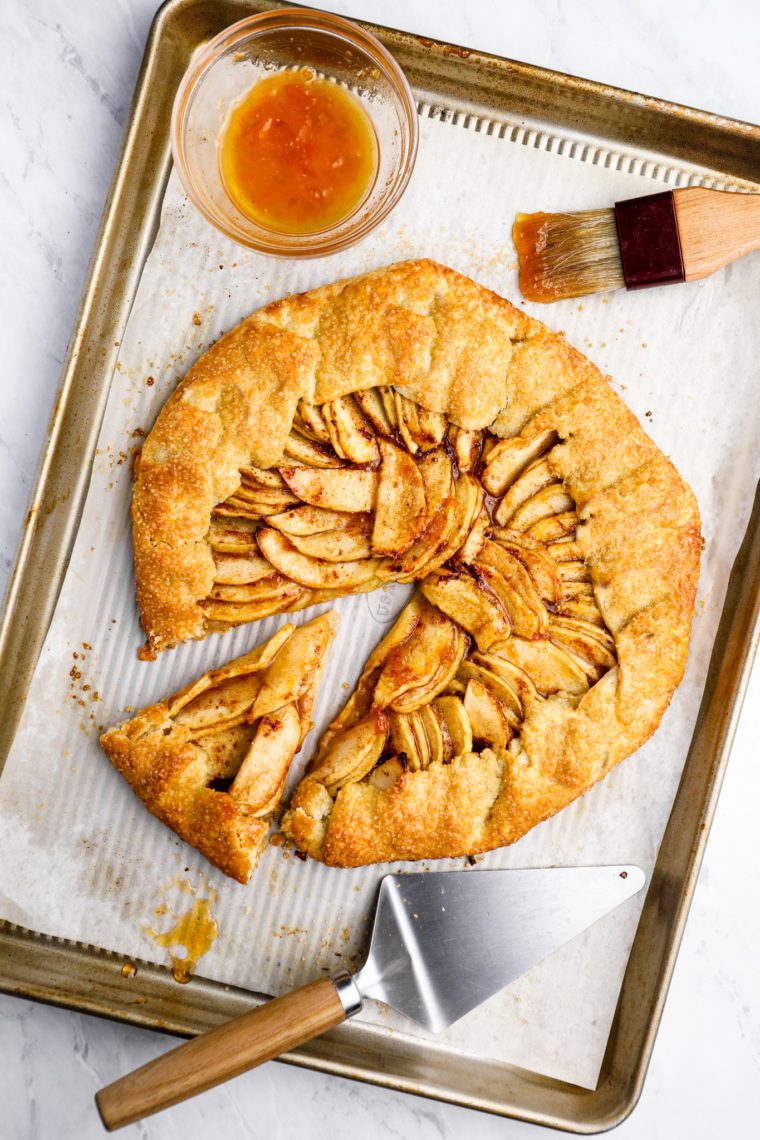
When you think of French desserts, you might imagine rows of colorful macarons, cream puffs, and glossy fruit tarts in a Parisian pastry shop. But at home, the French tend to keep things simple. This rustic French apple tart is the perfect example—like an apple pie without the pan, it features a buttery, flaky crust and cinnamon-spiced apples. Can’t you just picture it cooling on a windowsill in the French countryside?
If making homemade pastry feels intimidating, don’t stress! The dough for this apple tart recipe is surprisingly easy. It comes together in minutes in the food processor and rolls out like a dream. Best of all, with a free-form tart, there’s no need to fuss with crimping it into a pie plate—you simply fold the dough over the fruit. The charm of this dessert is in its imperfect, homemade look.
Once you’ve mastered this one, try my plum galette, which swaps apples for juicy, sweet plums. It’s another simple, elegant French-style dessert that always impresses.
“This is officially on the holiday dessert starting line up! I can’t stop going back for another bite! I truly love, love, love this tart.”
What you’ll need to make a french apple tart
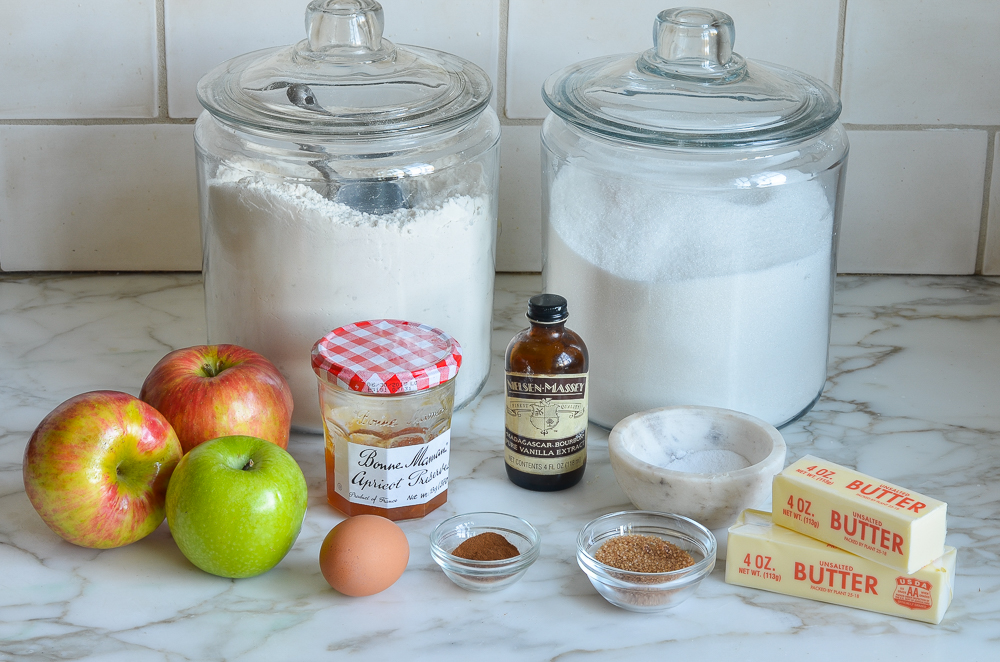
- All-purpose flour: Forms the base of the crust and provides structure to the dough and tart.
- Granulated sugar: Adds sweetness to the crust and filling, balancing the tartness of the apples.
- Butter: Makes the crust rich and flaky while also adding flavor to the filling.
- Baking apples: Use varieties like Honeycrisp, Jonagold, Fuji, Granny Smith, or Golden Delicious—and use a mix of different apples for the best flavor. Heads up: it can be tempting to load up the tart with extra apples, but less is more here—the apples release quite a bit of juice, which can leak from the tart and make a mess of the crust and your oven.
- Vanilla extract & Cinnamon: Adds warmth and enhances the sweetness in the apple filling.
- Egg: Brushed onto the crust for a golden, glossy finish.
- Turbinado sugar: Sprinkled on the crust and apples for added sweetness and a crunchy texture.
- Apricot jelly or jam (optional): Used to glaze the apples, giving them a glossy finish and adding a subtle fruit flavor.
- Jump to the printable recipe for precise measurements
Step-by-Step Instructions
Step 1: Make the pastry dough. Start by making the pastry. In a food processor fitted with the steel blade, combine the flour, salt, and sugar, and pulse a few times to mix. Add the cold butter and pulse again just until the pieces are about the size of peas—this should only take a few seconds. Sprinkle the ice water over the mixture and pulse a few more times, just until the dough looks moistened and crumbly.
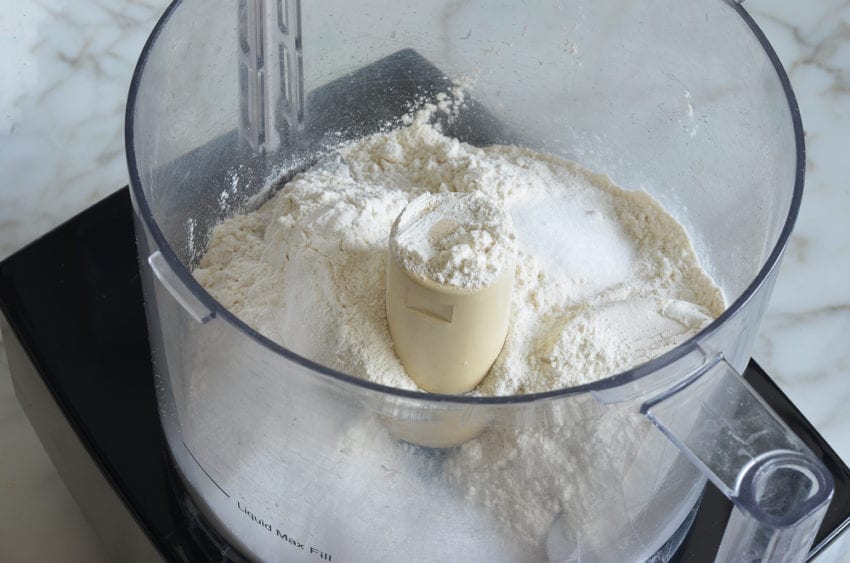
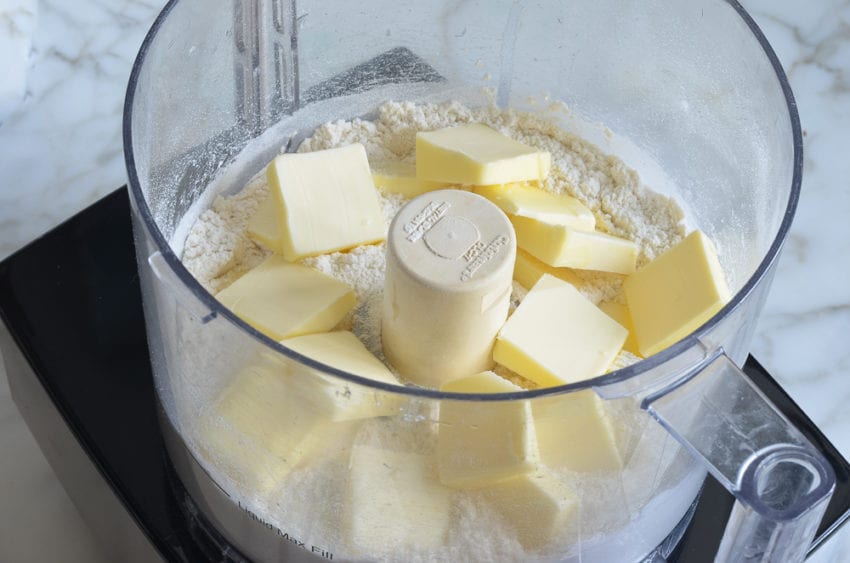
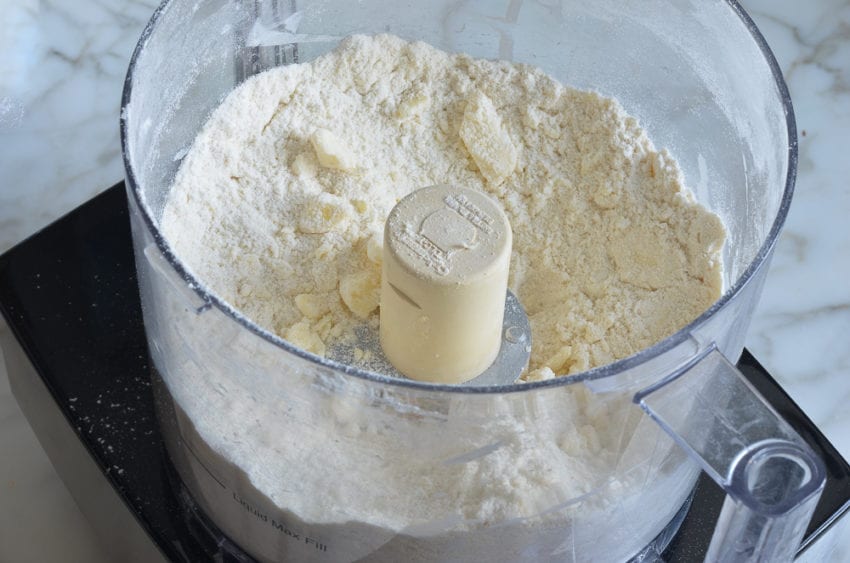
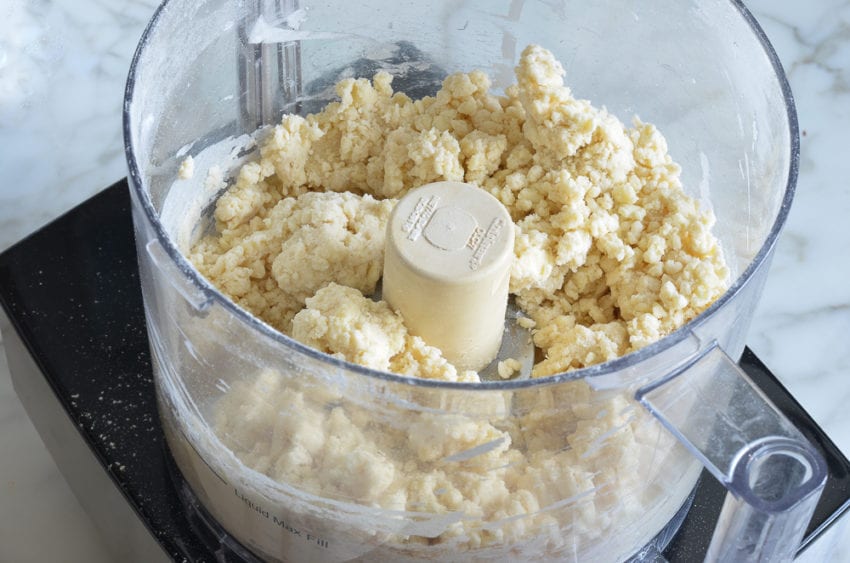
Step 2: Form and chill the dough. Transfer the dough to a lightly floured work surface and knead it a few times—just until it comes together into a smooth ball. Pat it into a disk, then lightly flour your surface and the dough. Roll it into a rough 8- to 10-inch circle, adding a little more flour as needed so it doesn’t stick. Move the dough to a parchment-lined baking sheet and refrigerate while you make the filling. (You’ll roll it out further on the parchment later, so you can go ahead and clean your work surface now.)
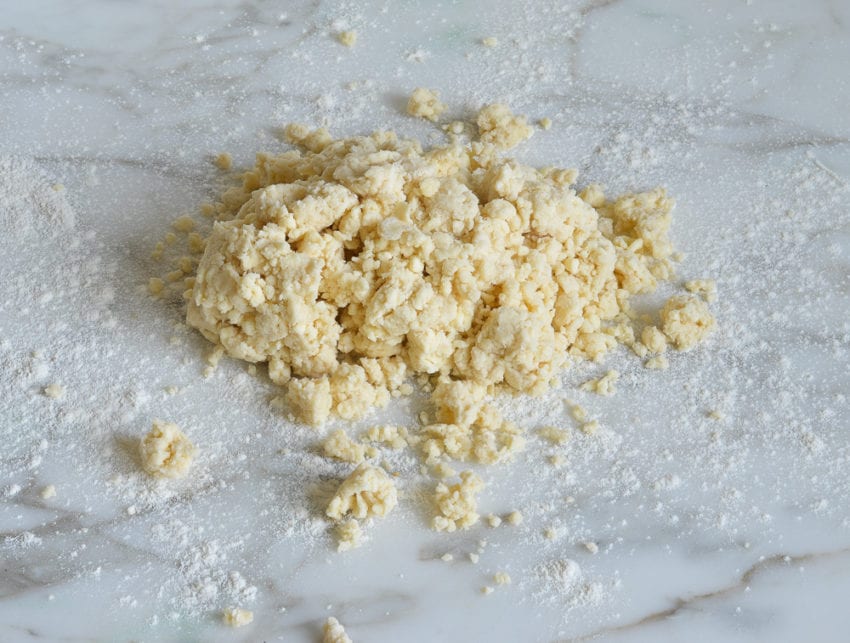
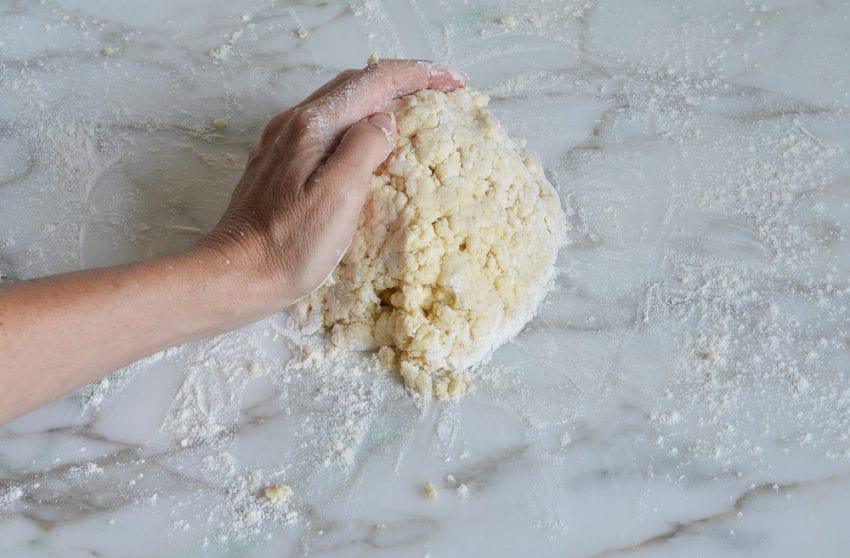
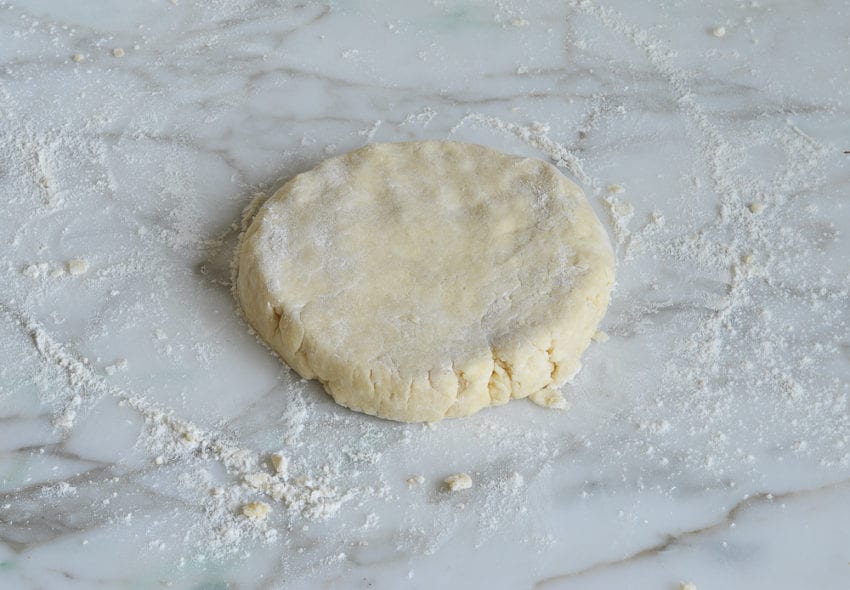
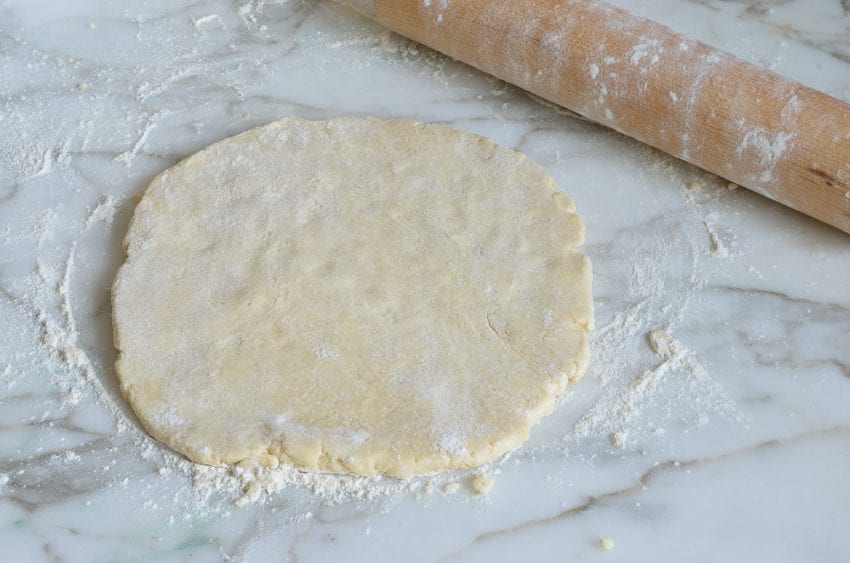
Step 3: Make the apple filling. Peel, core, and slice the apples about ⅛ inch thick (you should have roughly 4 cups) and place them in a large bowl. Add the sugar, vanilla, cinnamon, melted butter, and salt, and toss until the apples are evenly coated.
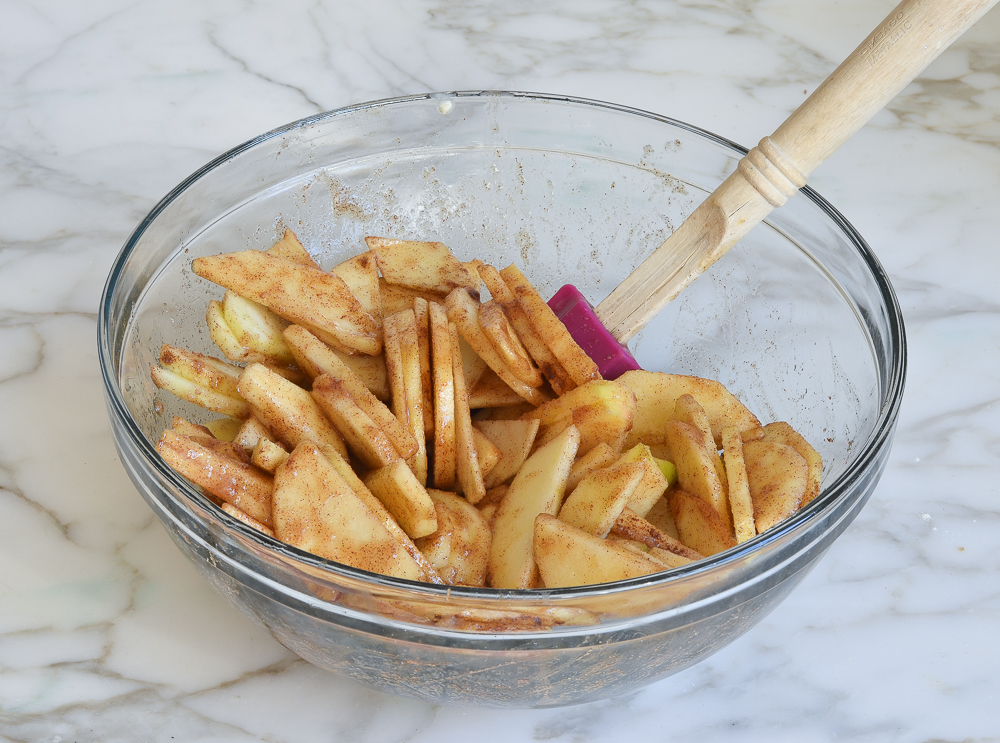
Step 4: Assemble the tart. Take the dough out of the fridge and slide the parchment onto your counter. Roll it out, right on the parchment, into a 14-inch circle about ⅛ inch thick. Transfer the parchment and dough back to the baking sheet so the edges curve slightly up the sides. Sprinkle 1 tablespoon of flour evenly over the dough, then arrange the apple slices in overlapping circles, leaving a 3-inch border.
Fold the edges of the dough up over the apples. Brush the crust with the beaten egg and sprinkle turbinado sugar over the edges and fruit. Chill the tart for 15 to 20 minutes while you preheat the oven.
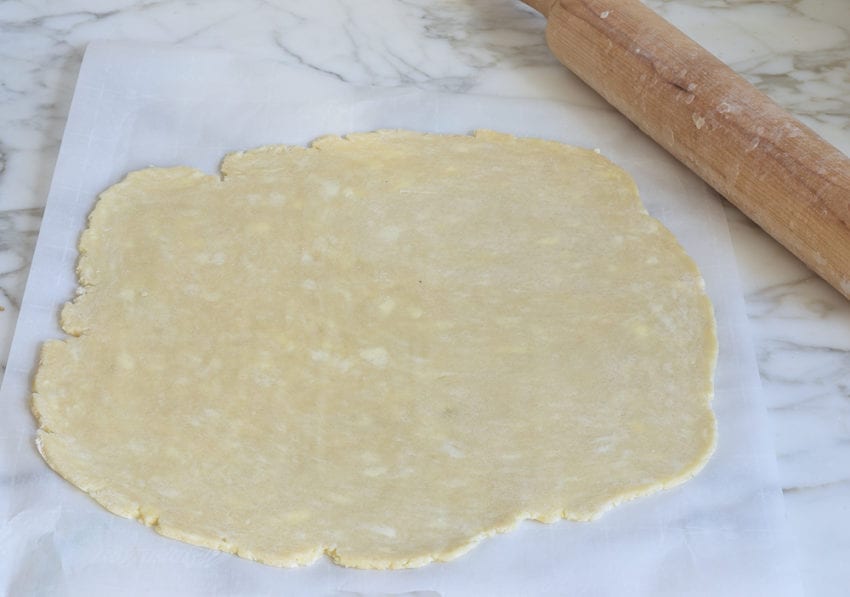
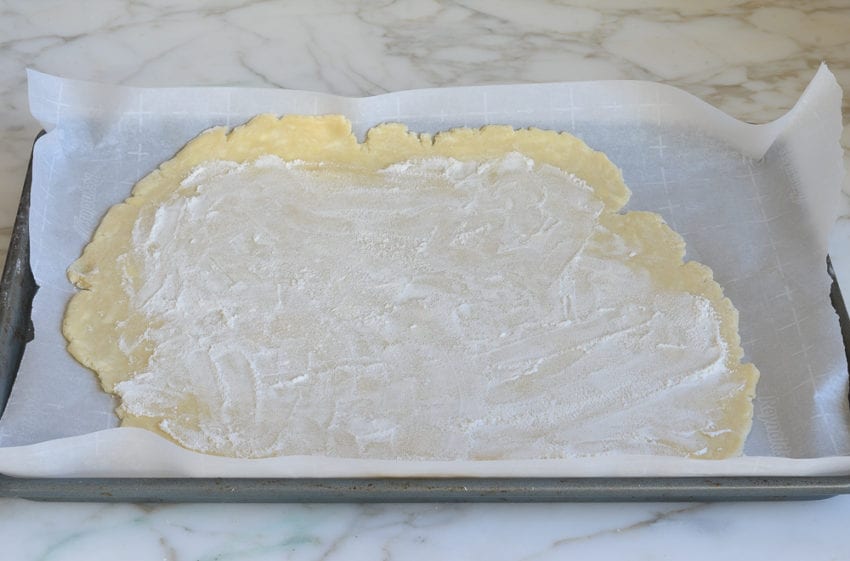
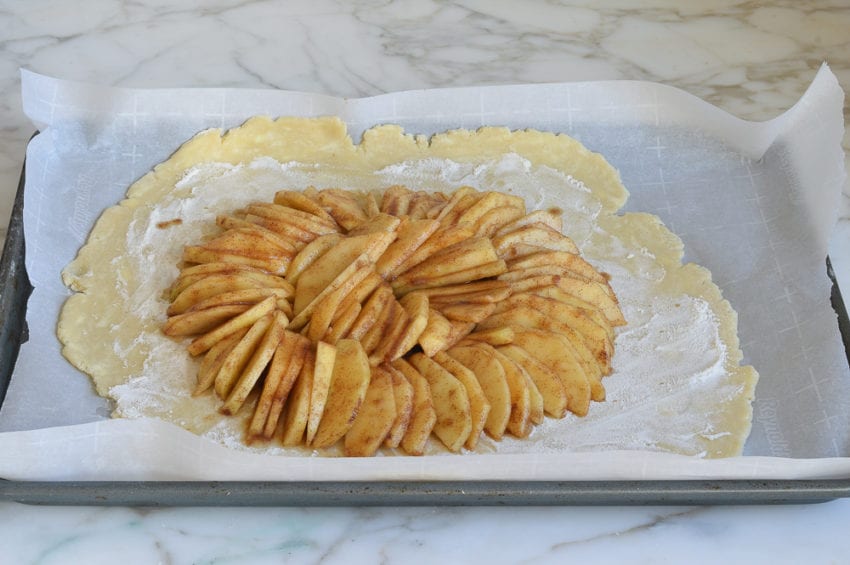
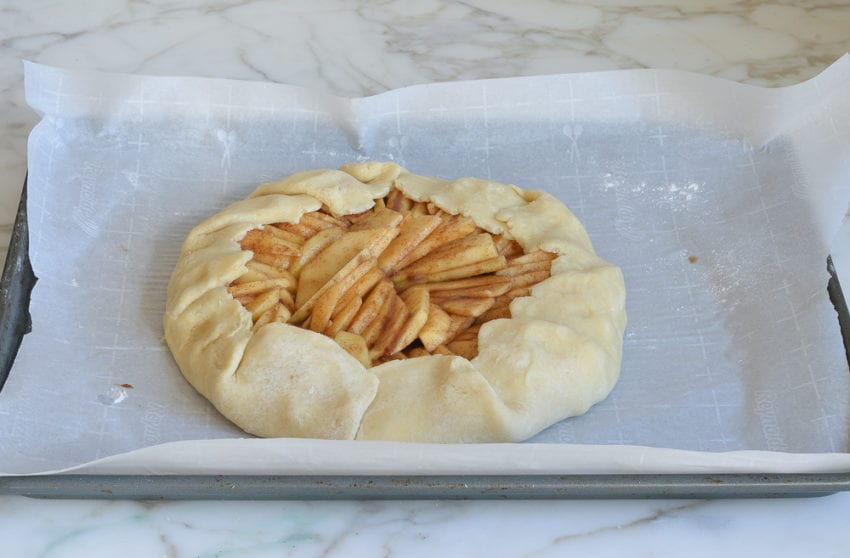
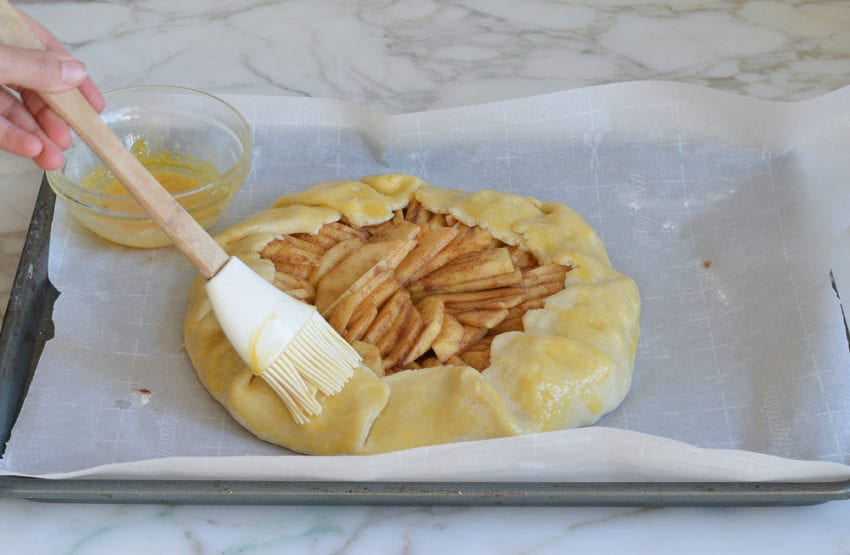
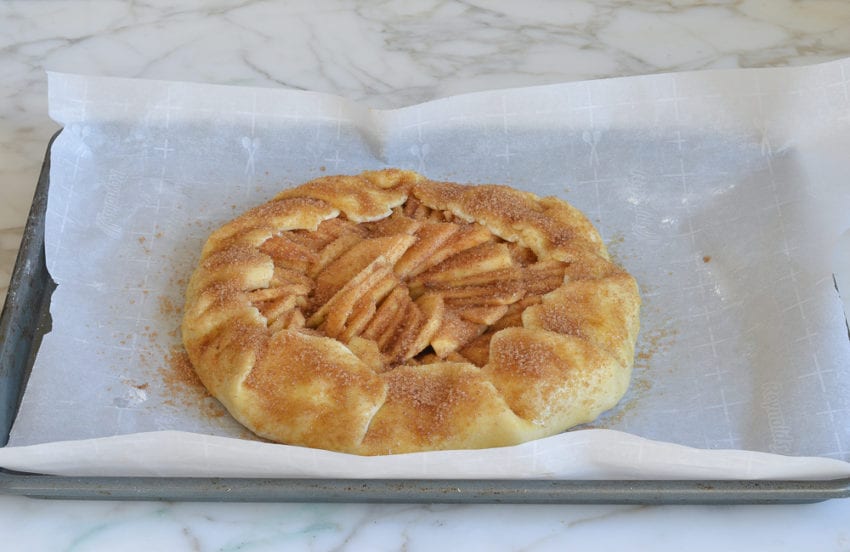
Step 5: Bake and finish. Bake for 55 to 65 minutes, until the apples are tender and the crust is golden and fully cooked. Transfer the pan to a rack and let the tart cool. While it cools, make the optional glaze: in a small bowl, mix the apricot jam with 1½ teaspoons of water and heat in the microwave until bubbling, about 20 seconds. Brush the warm glaze over the apples for a beautiful glossy finish. Slice and serve warm or at room temperature. The tart is best served on the day it is made, but leftovers will keep nicely for a few days.
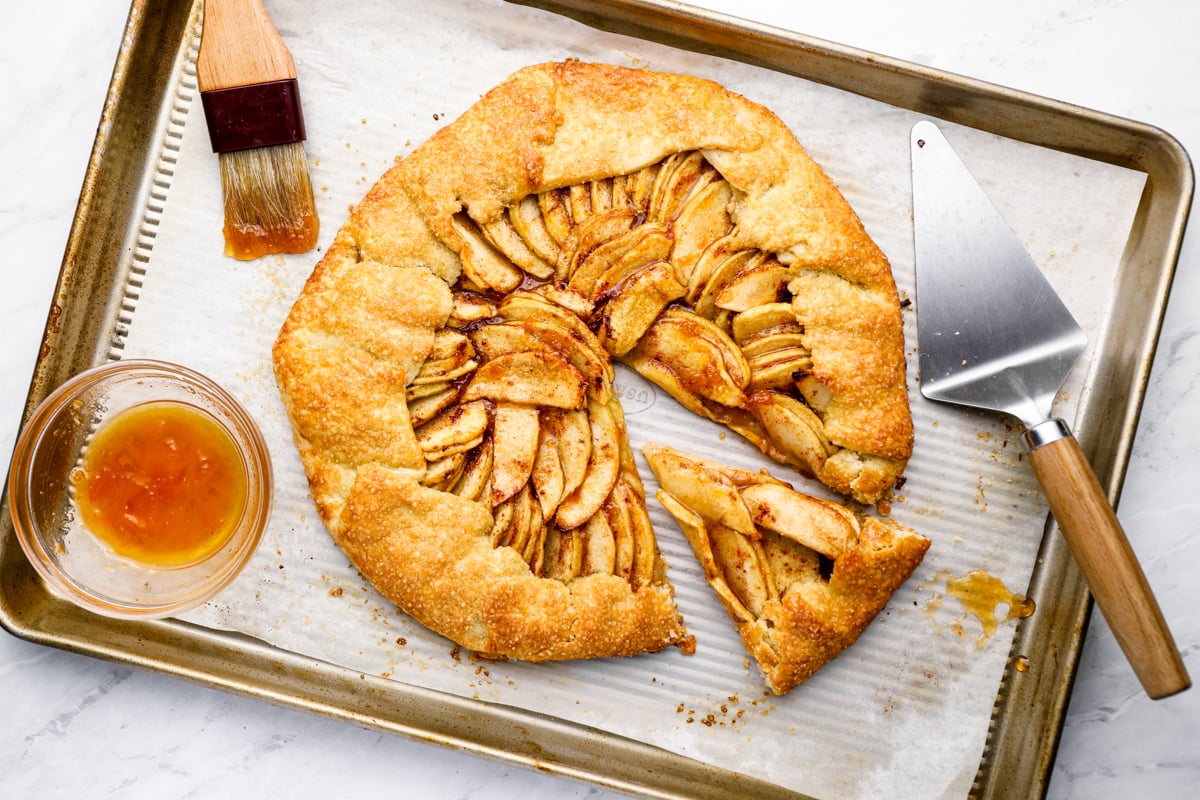
Video Tutorial
More Apple Sweets You may like
French Apple Tart
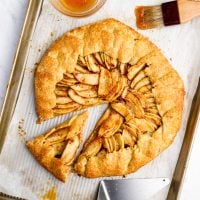
Ingredients
For the Crust
- 1½ cups all-purpose flour, spooned into measuring cup and leveled-off
- ½ teaspoon salt
- 2 tablespoons granulated sugar
- 12 tablespoons (1½ sticks) very cold unsalted butter, cut into ½-in (13-mm) pieces
- ¼ cup very cold water
For the Filling
- 1¾ lbs baking apples (3 large) (see note)
- ⅓ cup sugar
- 1 teaspoon vanilla extract
- 1 teaspoon cinnamon
- 2 tablespoons unsalted butter, melted
- ⅛ teaspoon salt
For Assembling & Baking
- 1 tablespoon all-purpose flour
- 1 egg, beaten
- 2 tablespoons turbinado sugar
- 1 tablespoon apricot jelly or jam (optional), for glaze
Instructions
- Make the crust: Line a baking sheet with parchment paper. In a food processor fitted with the steel blade, combine the flour, salt, and sugar. Pulse briefly to combine. Add the cold butter and process just until the butter is the size of peas, about 5 seconds. Sprinkle the ice water over the mixture and process just until moistened and very crumbly, about 5 seconds. Transfer the dough to a lightly floured work surface and knead a few times, just until it comes together into a cohesive ball. Pat the dough into a disk. Flour your work surface again and dust the dough with flour, as well. Using a rolling pin, roll into a circle 8 to 10 in (20 to 25 cm) in diameter, turning and adding more flour as necessary so the dough doesn’t stick. Transfer the dough to the parchment-lined baking sheet and refrigerate while you prepare the filling (you’ll roll the dough out further on the parchment paper, so go ahead and clean your work surface).
- Make the Filling: Peel, core, and cut the apples into ⅛-in (3-mm) thick slices (you should have about 4 cups) and place in a large bowl. Add the sugar, vanilla, cinnamon, melted butter, and salt; toss to combine.
- Take the dough from the fridge and slide the parchment paper onto the countertop. Roll the dough, directly on the parchment paper, into a 14-in (36-cm) circle about ⅛-in (3-mm) thick. It’s fine if the edges are a little ragged. Place the parchment and dough back on the baking sheet—the pastry should curve up the lip of the pan.
- Assemble the tart: Sprinkle the flour evenly over the pastry. Arrange the apple slices on top in overlapping concentric circles to within 3 in (7.5 cm) of the edge. Don’t worry about making it look perfect! It doesn’t make much difference in the end, and you don’t want the dough to get too warm. Fold the edges of the dough over the apples in a free-form fashion, working your way around and creating pleats as you go. Patch up any tears by pinching a bit of dough from the edge.
- Using a pastry brush, brush the pleated dough evenly with the beaten egg. Sprinkle 1 tablespoon of the turbinado sugar over the top crust and 1 tablespoon over the fruit. Chill the assembled tart in the fridge for 15 to 20 minutes.
- Meanwhile, preheat the oven to 350°F (175°C) and set an oven rack in the center position.
- Bake for 55 to 65 minutes, or until the apples are tender and the crust is golden and cooked through. (It’s okay if some of the juices leak from the tart onto the pan. The juices will burn on the pan but the tart should be fine—just scrape any burnt bits away from the tart once it’s baked.) Transfer the pan to a rack and let cool.
- While the tart cools, make the optional glaze. In a small bowl, mix the apricot jam with 1½ teaspoons water. Heat in the microwave until bubbling, about 20 seconds. Using a pastry brush, brush the apples with the apricot syrup.
- Use two large spatulas to transfer the tart to a serving plate or cutting board. Slice and serve warm or at room temperature. The tart is best served on the day it is made, but leftovers will keep, loosely covered on the countertop, for a few days.
Notes
- Be sure to use baking apples that hold their shape when cooked, such as Honeycrisp, Jonagold, Fuji, Granny Smith, or Golden Delicious. And use a mix of different varietals for the best flavor.
- Make-Ahead/Freezing Instructions: The dough can be made up to 3 days in advance and refrigerated. Allow it to sit at room temperature for about 15 minutes or until pliable before rolling. The assembled tart may be frozen for up to 3 months. To freeze, place the baking sheet in the freezer until the tart is frozen, then wrap tightly. (Wait until right before baking the tart to brush the beaten egg and sprinkle the sugar onto the crust.) Bake directly from the freezer. (It may take a few extra minutes to bake from frozen.)
Nutrition Information
This website is written and produced for informational purposes only. I am not a certified nutritionist and the nutritional data on this site has not been evaluated or approved by a nutritionist or the Food and Drug Administration. Nutritional information is offered as a courtesy and should not be construed as a guarantee. The data is calculated through an online nutritional calculator, Edamam.com. Although I do my best to provide accurate nutritional information, these figures should be considered estimates only. Varying factors such as product types or brands purchased, natural fluctuations in fresh produce, and the way ingredients are processed change the effective nutritional information in any given recipe. Furthermore, different online calculators provide different results depending on their own nutrition fact sources and algorithms. To obtain the most accurate nutritional information in a given recipe, you should calculate the nutritional information with the actual ingredients used in your recipe, using your preferred nutrition calculator.
Comments
Add a Comment Cancel reply
This site uses Akismet to reduce spam. Learn how your comment data is processed.
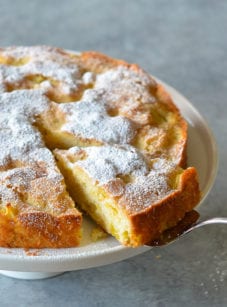
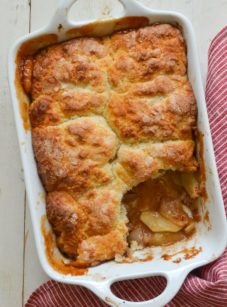
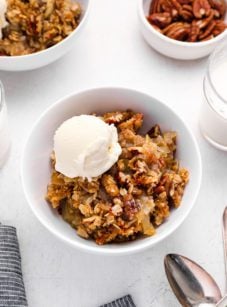


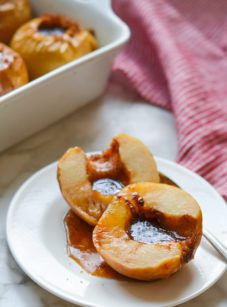


Hi Jenn,
Can I use a round puff pastry sheet instead?
Thanks!
Hi Heather, I’ve never made this with puff pastry, but I suspect it should work. Please LMK how it turns out if you try it!
This is delicious! I have made it multiple times.
I’ve made this recipe many times and have been remiss in registering my “comment.” The tart is magnifique; another winner from Jenn! Many thanks for your hard work in providing — and maintaining — a truly superior website for us home cooks.
❣️
I made this yesterday to take to friends’ for dessert, and it came out perfectly! Despite the fact that I had 2 small and 2 large apples, so the center didn’t look gorgeous, every single part of it was tasty. The center of the tart was perfectly crisp, and it looked just like the photo! Living at 7,000 ft. elevation, baking has its hazards, but this was the easiest pastry I’ve made at altitude. Many thanks!
I really love this recipe and have made it many times and it always comes out beautifully- as a chef I do wonder why bake at 350 degrees and not a higher temp?
Hi Tiffany, so glad you like it! Many similar recipes call for puff pastry, which generally bakes at a higher temperature, so I wonder if that’s what you may be referring to.
I *love* this recipe. I find it much easier than a traditional apple pie and I like the higher ratio of crust to apples as compared to apple pie. One question — my apples when mixed with the sugar and cinnamon release a bit of liquid — should I add this liquid to the tart or is it better to omit it?
Hi Elsie, you can include the liquid (and glad you like the tart)!
I am a pretty experienced baker and like this recipe. However, the last two times I’ve made it the butter melted out of the crust quite dramatically. It’s actually in my oven right now and I’ve had to watch it and try to sop up the butter so the tart doesn’t burn. I let it rest in the fridge for 30 minutes to try to combat that. I may have to use a different crust recipe.